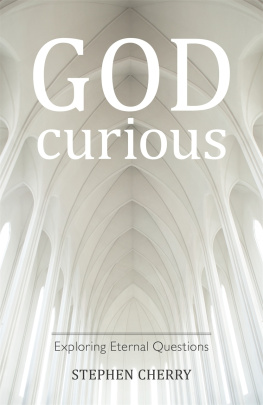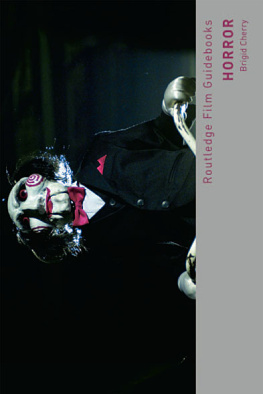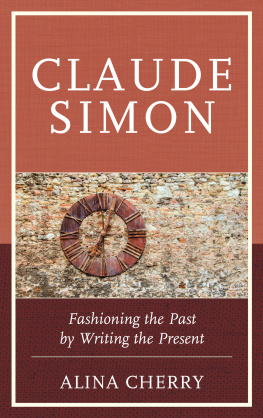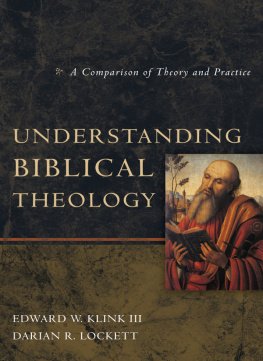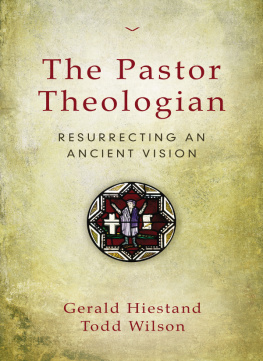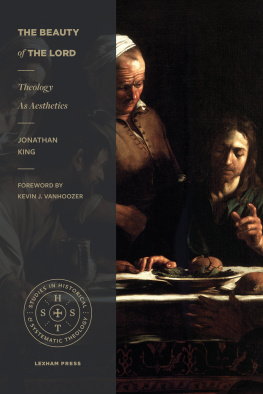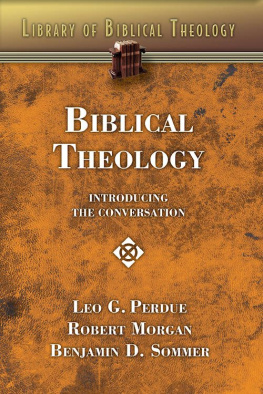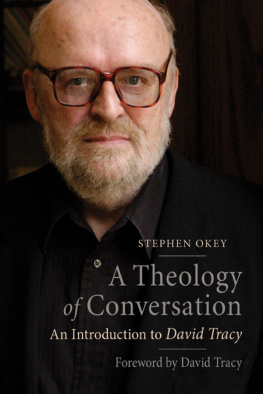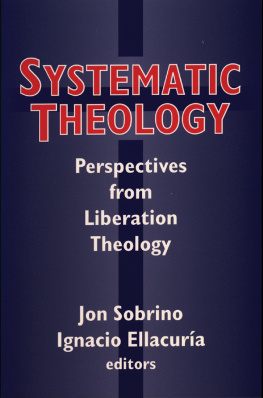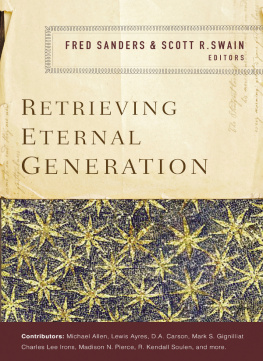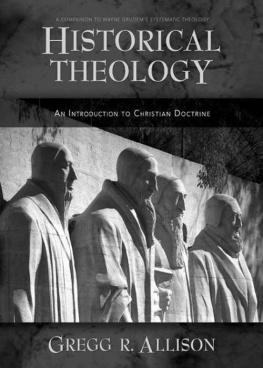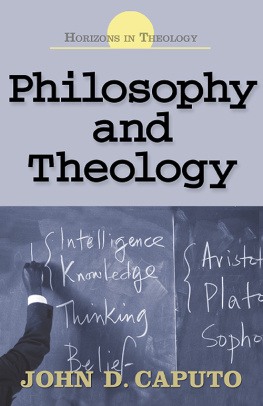
In the 21st century, theology might appear to be some historical residue left over from out-of-date worldviews, and studying it as quirky as trying to decipher Egyptian hieroglyphics but less interesting. Stephen Cherry characteristically makes us think again, pointing to theology as the disciplined, human and holistic way in which we explore the eternal questions that hover over every century. The rumour of God that circles the book, implying that reality might be worthy of trust, is compelling and unignorable. I hope this work will entice a new generation of theologians fit for purpose, imaginative in language, engagement and prayer.
Canon Mark Oakley, Chancellor of St Pauls Cathedral
In a world of glib sound-bites, a world that sneers at experts, it has never been more important to encourage people to read and think for themselves. Stephen Cherrys accessible, passionate and entertaining introduction to the key ideas of Christian theology does just that. Vital ideas are explained lucidly and powerfully, old ideas are brought to life in new contexts, and Stephen Cherry not only makes the case for theology, but stimulates a new enthusiasm for it.
Malcolm Guite, Priest, Poet, and Chaplain of Girton College, Cambridge
This is an unusual and original book designed to interest and encourage those thinking of studying theology or religious studies as an academic discipline more specifically, those thinking of reading it at university. Unlike many academic subjects, Cherry argues, theology is more a matter of the questions you ask, than any traditional certainties: as an enterprise [it] only makes sense if you know that you dont know all the answers already. Supporting his thesis by a sweeping history of Christianity in 20 tweets, the Dean of Kings College, Cambridge, gives an interesting and thoughtful introduction to a subject that has increasingly come to fascinate him the more he has studied it.
Stephen Prickett, Regius Professor Emeritus of English, University of Glasgow, and Honorary Professor, University of Kent at Canterbury
GOD-CURIOUS
Exploring Eternal Questions
STEPHEN CHE RR Y

Jessica Kingsley Publishers
London and Philadelphia
Disclaimer: Every effort has been made to trace copyright holders and to obtain their permission for the use of copyright material. The author and the publisher apologize for any omissions and would be grateful if notified of any acknowledgements that should be incorporated in future reprints or editions of this book.
First published in 2017
by Jessica Kingsley Publishers
73 Collier Street
London N1 9BE, UK
and
400 Market Street, Suite 400
Philadelphia, PA 19106, USA
www.jkp.com
Copyright Stephen Cherry 2017
All rights reserved. No part of this publication may be reproduced in any material form (including photocopying, storing in any medium by electronic means or transmitting) without the written permission of the copyright owner except in accordance with the provisions of the law or under terms of a licence issued in the UK by the Copyright Licensing Agency Ltd. www.cla.co.uk or in overseas territories by the relevant reproduction rights organization, for details see www.ifrro.org. Applications for the copyright owners written permission to reproduce any part of this publication should be addressed to the publisher.
Warning: The doing of an unauthorized act in relation to a copyright work may result in both a civil claim for damages and criminal prosecution.
Library of Congress Cataloging in Publication Data
A CIP catalog record for this book is available from the Library of Congress
British Library Cataloguing in Publication Data
A CIP catalogue record for this book is available from the British Library
ISBN 978 1 78592 199 5
eISBN 978 1 78450 473 1
I have no special talents.
I am only passionately curious.
Albert Einstein
CONTENTS
WELCOME
This little book is a personal invitation to explore theology. I sat down to write it in the hope that it would be helpful to people who are considering what to read at university. But as the writing continued, I came to feel it could be intriguing to people at any stage of life. Theology is such a huge and hugely interesting subject.
Actually theology is much more than a subject. Its more like a form of seeking, a quest; and that is why for me theology is not so much about answers, as about questions; not so much about knowing, as about wondering; not so much about gaining knowledge, as about enriching your perspective on experiences that make you wonder.
In universities today the subject of theology is being challenged and reshaped, but the quest of theology is much older than any of our educational institutions. It is a seeking after wisdom that is based on the intuition that there is more to life than we can ever know. I suspect that such seeking is as old as language itself or at least as old as the capacity to ask questions about the meaning and purpose of life, and to wonder about what might be just beyond the realms of our ordinary experience and common sense.
One way to define theology might be as the quest to understand God. However, in the tradition to which the book seeks to introduce you, such a quest is deeply intertwined with the quest to understand other people and the quest to understand yourself; three projects that are integrated in the ancient religious teaching that you should love God, love your neighbour and love yourself.
Theology is something you will enjoy if you find yourself asking questions like these: Why are we here?, What might become of us in the very long-term future?, Why do some very good people have to endure very painful experiences?, Does the word God have meaning?, To what extent are religions similar or different?, Are human beings born bad or are they fundamentally good?, Why are special books so important in many religions?, What do religious traditions have to teach us about justice or truth, peace or hope?, Is love merely a romantic phase of life, or does it lie at the heart of the deepest reality? If questions like these resonate with you, if they matter to you more than the easy, trivial or glib answers they often get, then you might well enjoy exploring theology.
Theology, then, is the discipline of asking the best possible question about the most important matter that you can imagine. It is about coming to the limit of your own knowledge and insight and posing the question, What is beyond?
And if that intrigues you, do read on.
Chapter 1
CONFESSIONS OF A RELUCTANT THEOLOGIAN
Let me begin by telling the story of how I came to be a theologian of sorts.
When I was at school I loved science. I felt that Biology and Chemistry in particular were teaching me extraordinary truths about the world and at times I felt like my mind would explode with new knowledge. I also liked the way scientists found things out by making observations and doing experiments. I decided to continue with science at university. I did very badly in my A-levels but still got into a good university to study what was then called General Science. I knew I was going to a completely new world. No member of my family had been to university before, and I was very anxious about it. In fact I felt that I had only got in because of an administrative error. Today I would say that I had a bad dose of imposter syndrome, but I had never heard of that in those days so I just suffered from it in sad ignorance of the reality that many people feel the same way in a new environment that they dont deserve to be there, or dont belong. And it was in the middle of my worst episode of imposter syndrome that I was asked by the Dean of Sciences which particular sciences I would like to study. I answered Biology and Chemistry and to my horror received the answer, But you are not very good at those subjects why not try something else?
Next page
